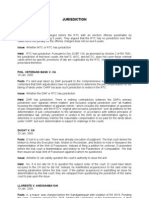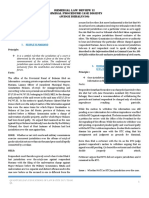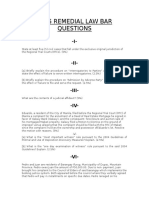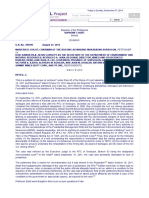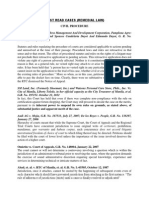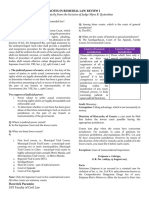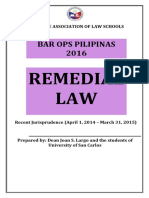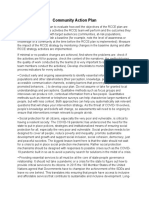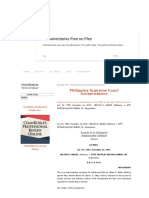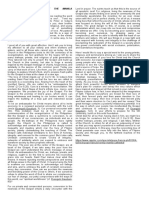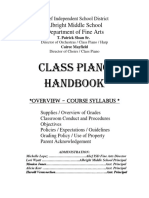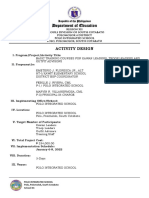Rodrigo, Myla Leonelle A.
2018-031
Remedial Law 1
Case Critique
CASE NO. 1:
HANNAH EUNICE D. SERANA
vs.
SANDIGANBAYAN and PEOPLE OF THE PHILIPPINES
G.R. No. 162059 January 22, 2008
On the issue of jurisdiction, Serena moved to quash the information of estafa against her.
In her capacity as a UP student regent, the Sandiganbayan does not have any jurisdiction
over the offense charged or over her person.According to her, she was not a public
officer since she merely represented her peers and did not receive any salary as a student
regent, in contrast to the other regents who held their positions in an ex officio capacity.
The Special Prosecutor of the Ombudsman in representation for the People of the
Philippines contended that Serena was a public officer and that under Sec 4 (b) of PD
No. 1606 a catch-all phrase “in relation to office”, the Sandiganbayan has jurisdiction
over the charges against the petitioner.
The primary issue in the case is whether the Sandiganbayan has jurisdiction over her
person in her capacity as former member of the UP Student Regent without having the
salary grade of at least 27.
The Court held against Serena that is, the Sandiganbayan has jurisdiction to try the case
of estafa against her and his brother as his conspirator. Having read jurisprudence
decided years after this decision was promulgated, the decision in the instant case will
not stand the test of time. Though there are slight nuances in the facts involved, I think
that the Supreme Court was too rigid in the application of the law. At some point, I think
it may have gone a little too overboard here. It held a member of the student regent
should come under the jurisdiction of the Sandiganbayan although the position was not at
least SG 27 however in a succeeding case included in our syllabus i.e. Duncano v.
Sandiganbayan involving a BIR Regional Director whose scope and function is clearly
more encompassing that of a member of the student regent was held to be not under the
jurisdiction of the Sandiganbayan. In both cases, their positions are not of SG 27.
�Rodrigo, Myla Leonelle A.
2018-031
Remedial Law 1
Case Critique
CASE NO. 2:
THE MUNICIPALITY OF TANGKAL, PROVINCE OF LANAO DEL NORTE,
v.
HON. RASAD B. BALINDONG, IN HIS CAPACITY AS PRESIDING JUDGE,
SHARI'A DISTRICT COURT, 4TH JUDICIAL DISTRICT, MARAWI CITY,
AND HEIRS OF THE LATE MACALABO ALOMPO, REPRESENTED BY
SULTAN DIMNANG B.ALOMPO
G. R. No. 193340, January 11, 2017
Pertinent to the topic of jurisdiction, the opposing parties raised the following arguments.
On the part of the petitioner, The Municiality of Tangkal, Province of Lanao del Norte, it
contended that since the municipality has no religious affiliation and represents no
cultural or ethnic tribe, it cannot be considered as a Muslim under the Code of Muslim
Personal Laws. Moreover, the complaint at bar is one for recovery of land that is, a real
action, therefore it should have been filed in the appropriate RTC of Lanao del Norte.
The private respondents who are the heirs of the owner of the land in dispute refuted
such argument saying that since the mayor of Tangkal, Abdulazis Batingolo is a Muslim,
the case comes under the jurisdiction of the Shari’ah Courts as provided in the Code of
Muslim Personal Laws. In addition, the venue was properly laid because the Shari’ah
District Court involved has territorial jurisdiction over the provinces of Lanao del Sur
and Lanao del Norte, which the said municipality is a part of.
As to the issue of the case, it pertains to the scope of jurisdiction of Shari’ah Courts. As
pointed out in the case, this case is a unique one. Particularly, the parties involved on one
hand is a juridical person, on the part of the petitioner, while on the part of the private
respondent are natural persons--heirs of the descendant they represent. The action in the
instant case is one for recovery of possession of real property.
The Supreme Court decided in favor of the Muncipality of Tangkal which I fully sibcribe
to as well. Many aspects were taken into consideration however the Court strictly
construed the pertinent laws. Particularly, it emphasized the Code of Muslim Personal
Laws of the Philippines. According to said law, while the Shari’ah Courts have
concurrent jurisdiction over personal and real actions,this only applies when the parties
involved are Muslims. Further, the Municipality of Tangkal, represented by its mayor
who though may be a Muslim only acts as a representative capacity. The real party in
interest is the local government unit involved who cannot be classifies as a Muslim or
otherwise as it is a juridical person. Finally, the Court held that the proper forum of the
action should be with the Regional Trial Court. Assessing the decision, I fully subscribe
that the said decision will stand the test of time. The logic and legal basis were briefly
but thoroughly presented.
�Rodrigo, Myla Leonelle A.
2018-0531
Remedial Law 1
Case Critique
CASE NO.3:
REGULUS DEVELOPMENT, INC.
vs.
ANTONIO DELA CRUZ
G.R. No. 198172 January 25, 2016
The following arguments were raised by the parties regarding the order of levy granted
by the RTC vis-a-vis equity jurisdiction:
On the part of the petitioner: first, that the RTC’s release of the consigned rentals and
levy were ordered in the exercise of its equity jurisdiction; second, that the respondent’s
petition in CA-G.R. SP No. 105290 regarding the levy was already moot and academic
with the conduct of the auction sale and redemption of the respondent’s real
property; third, that the petition in CA G.R. SP No. 105290 should have been dismissed
outright for lack of signature under oath on the Verification and Certification against
Forum Shopping.
The respondent refuted the petitioner’s arguments. On the first argument, respondent
merely reiterated the CA’s conclusion that the RTC had no jurisdiction to order the levy
on respondent’s real property as it no longer falls under the allowed execution pending
appeal. On the second argument, the respondent contended that the levy on execution
and sale at public auction were null and void, hence the CA decision is not moot and
academic. On the third argument, the respondent simply argued that it was too late to
raise the alleged formal defect as an issue.
Regarding jurisdiction, taking into consideration that this is originally a case for
ejectment, the issue is the propriety of orders issued by the Regional Trial Court to levy
the respondent’s real property in exercise of its equity jurisdiction.
The Court ruled in the affirmative. This is in consonance with Rule 39, Sec 5, and
Sections 5 and 6 of Rule 135. It explained that the levy of the respondent’s property was
made pursuant to the RTC orders issued in the exercise of its equity jurisdiction,
independent of the ejectment case originally filed with the MTC. The RTC’s equity
jurisdiction is separate and distinct from its appellate jurisdiction on the ejectment case.
Further on the importance of equity jurisdiction, the Court explained that equity
jurisdiction aims to provide complete justice in cases where a court of law is unable to
adapt its judgments to the special circumstances of a case because of a resulting legal
inflexibility when the law is applied to a given situation. The purpose of the exercise of
equity jurisdiction, among others, is to prevent unjust enrichment and to ensure
restitution. To end, the decision was grounded on law and may stand the test of time.
�Rodrigo, Myla Leonelle A.
2018-0531
Remedial Law 1
Case Critique
CASE NO. 4:
THE CITY OF MANILA, represented by MAYOR JOSE L. ATIENZA, JR., and
MS. LIBERTY M. TOLEDO, in her capacity as the City Treasurer of Manila,
vs.
HON. CARIDAD H. GRECIA-CUERDO,
G.R. No. 175723 February 4, 2014
Having obtained an unfavorable decision in the RTC regrading their petition for refund
for tax erroneously paid to the City of Manila, private respondents, the SM group
elevated the case and filed a special civil action for certiorari with the Court of Appeals.
The appellate court dismissed petitioners' petition for certiorari holding that it has no
jurisdiction over the said petition. The CA ruled that since appellate jurisdiction over
private respondents' complaint for tax refund, which was filed with the RTC, is vested in
the Court of Tax Appeals (CTA), pursuant to its expanded jurisdiction under Republic
Act No. 9282 (RA 9282), it follows that a petition for certiorari seeking nullification of
an interlocutory order issued in the said case should, likewise, be filed with the CTA.
Likewise, the Motion for Reconsideration was denied.
The central issue in this case is whether or not the CTA has jurisdiction over a special
civil action for certiorari assailing an interlocutory order issued by the RTC in a local tax
case.
The Court held that the Court of Tax Appeals has the proper jurisdiction in the instant
case. Republic Act No. 1125 (RA 1125) creating the CTA clearly sets for the jurisdiction
of the said appellate court without further need for interpretation . Further Republic Act
No. 9282 (RA 9282) amending RA 1125 by expanding the jurisdiction of the CTA,
enlarging its membership and elevating its rank to the level of a collegiate court with
special jurisdiction. LIkewise citing jurisprudence, the court reiterated the power of the
CTA to issue the as jurisdiction to issue the extraordinary writ of certiorari, in aid of its
appellate jurisdiction, "where the Court stated that "a court may issue a writ of certiorari
in aid of its appellate jurisdiction if said court has jurisdiction to review, by appeal or
writ of error, the final orders or decisions of the lower court.”
Where the law is clear, there is not need for further construction. Due to the foregoing, it
can be said thereat that this case can stand the test of time.
�Rodrigo, Myla Leonelle A.
2018-031
Remedial Law 1
Case Critique
CASE NO. 5:
INTRAMUROS ADMINISTRATION
vs.
OFFSHORE CONSTRUCTION DEVELOPMENT COMPANY
G.R. No. 196795, March 07, 2018
Regarding the Petition for Review which was lodged directly to the Supreme Court vis-
a-vis the principle of hierarchy of courts, the opposing parties have these to say.
In its Comment, Offshore Construction argues that the Petition for Review should be
dismissed because it violates the principle of hierarchy of courts and raises questions of
fact. It points out that Intramuros did not move for the reconsideration of the Regional
Trial Court April 14, 2011 Decision. Instead of directly filing with this Court, Intramuros
should have filed a Petition for Review with the Court of Appeals, in accordance with
Rule 42 of the Rules of Court. It claims that Intramuros raises questions of fact in its
Petition for Review, namely, the expiration of the Contracts of Lease and the business
concession in favor of Offshore Construction.
On the part of the Intramuros Administration, it argues that direct resort to the Supreme
Court is proper because the issues it raises in its Petition for Review do not require
review of evidence to resolve, and the facts of the case are undisputed. It claims that the
nature of Intramuros and Offshore Construction's relationship is never an issue because
all the documents referenced and relied upon by the parties were lease agreements.
The issue central to this case is the propriety of the action of Intramuros Administration
of directly resoring to the Supreme Court i.e. the principle of hierarchy of courts was not
strictly followed.
The Court held that yes, direct resort of Intramuros to the SC instead of the Court of
Appeals is proper and warranted under the circumstances. Although as sanctioned by the
rules, it violates the principle of hierarchy of courts, nonetheless, the doctrine of
hierarchy of courts is not inviolable, and this Court has provided several exceptions to
the doctrine. One of these exceptions is the exigency of the situation being litigated.Here,
the controversy between the parties has been dragging on since 2010, which should not
be the case when the initial dispute-an ejectment case-is, by nature and design, a
summary procedure and should have been resolved with expediency. Moreover, this
Court's rules of procedure permit the direct resort to this Court from a decision of the
Regional Trial Court upon questions of law, such as those which petitioner raises in this
case. As indicated, the principle of heirarchy of courts was not strictly applied. As all
laws, there is always an exception to the rule. Nonetheless, this decision can still stand
the test of time.
�Rodrigo, Myla Leonelle A.
2018-0531
Remedial Law 1
Case Critique
CASE NO. 6:
GEORGE KATON
vs.
MANUEL PALANCA JR., LORENZO AGUSTIN, JESUS GAPILANGO and
JUAN FRESNILLO
G.R. NO. 151149 : September 7, 2004
The dispute was regarding of whether the is CA correct in invoking its alleged “residual
prerogative” under Sec. 1, Rule 9 of the Rules of Court in resolving the petition on an
issue not raised in the petition.
The Supreme Court ruled in the affirmative. Petioner Katon confused residual
prerogative from residual jurisdiction. The Court took its time to explain the difference.
Under Section 1 of Rule 9 of the Rules of Court, defenses and objections not pleaded
either in a motion to dismiss or in the answer are deemed waived, except when (1) lack
of jurisdiction over the subject matter, (2) litis pendentia, (3) res judicata and (4)
prescription are evident from the pleadings or the evidence on record. In the four
excepted instances, the court shall motu proprio dismiss the claim or action.
On the other hand, residual jurisdiction is embodied in Section 9 of Rule 41 of the Rules
of Court. The "residual jurisdiction" of trial courts is available at a stage in which the
court is normally deemed to have lost jurisdiction over the case or the subject matter
involved in the appeal. This stage is reached upon the perfection of the appeals by the
parties or upon the approval of the records on appeal, but prior to the transmittal of the
original records or the records on appeal. In either instance, the trial court still retains its
so-called residual jurisdiction to issue protective orders, approve compromises, permit
appeals of indigent litigants, order execution pending appeal, and allow the withdrawal
of the appeal. The Court of Appeal’s motu proprio dismissal of petitioner’s Complaint
could not have been based, therefore, on residual jurisdiction under Rule 41. Undeniably,
such order of dismissal was not one for the protection and preservation of the rights of
the parties, pending the disposition of the case on appeal. What the CA referred to as
residual prerogatives were the general residual powers of the courts to dismiss an action
motu proprio upon the grounds mentioned in Section 1 of Rule 9 of the Rules of Court
and under authority of Section 2 of Rule 114 of the same rules.
The Court was very clear in its distinction regarding the two concepts and can be deemed
that it will stand the test of time.



